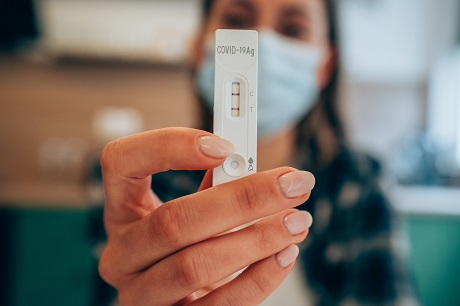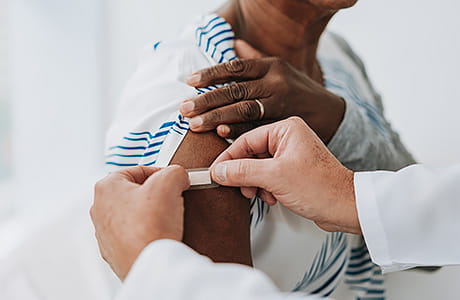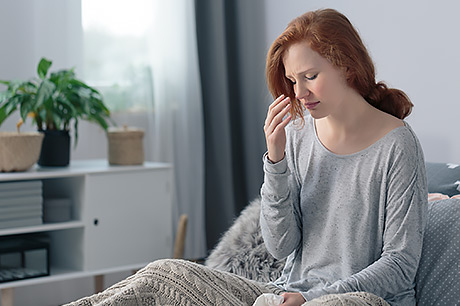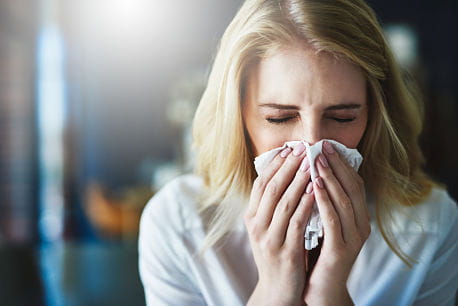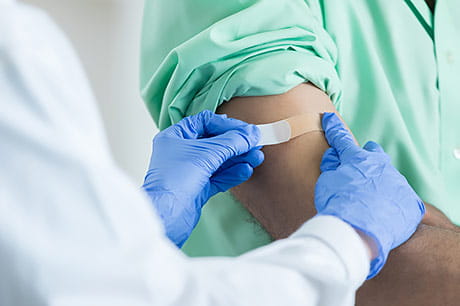How to use a COVID-19 at-home test
Get the most accurate results possible and know when (and if) you should take a second test.
Need to use an at-home COVID-19 test? There are a few things you should know about these tests, also known as antigen tests, to get the most accurate results possible.
“Sometimes, an at-home test is appropriate,” says Donna Wolk, PhD, director of the Division of Molecular and Microbial Diagnostics and Development. “And other times, it might be best to schedule a molecular (RT-PCR) test at a local clinic, testing site or pharmacy.”
Let’s look at how antigen tests work and how they compare to PCR tests.
Antigen tests vs. PCR tests
At-home COVID antigen tests can save you a trip to your doctor’s office, an urgent care clinic or COVID testing center.
“If you have mild or no symptoms, at-home testing is your most convenient testing option, but following directions on the at-home test box is critical,” says Dr. Wolk. In a recent report, as many as one in three at-home tests are being misinterpreted by people using them.
Antigen tests work by finding proteins on the surface of the virus that causes COVID-19. On the other hand, PCR tests find targeted pieces of genetic material (RNA) from the virus. Both tests are used to diagnose current infection, but an at-home test can yield results within 15 to 30 minutes, while PCR tests take longer because they need to be processed by a laboratory.
Tips for accurate at-home test results
Make sure any tests you purchase are authorized for emergency use by the FDA. And always read the box — and check the expiration date — each time you use one.
Instructions may vary slightly for different at-home tests, but most involve rubbing a nasal swab inside each nostril a certain number of times. After you expose the swab to a few drops of chemicals, you’ll have the results in 15 to 30 minutes.
When you’re taking an at-home test, make sure to time it right. “You’ll want to test within three to five days after you’ve been exposed, or when you start to have symptoms of COVID,” says Dr. Wolk.
PCR tests are typically positive before an antigen test will detect the virus and give you a positive result. This is because rapid antigen tests aren’t as sensitive at detecting the virus as PCR tests — particularly if you use the test too early in the course of infection.
“If you really do have COVID and you use an at-home test too early, the virus amount in your nose may not be high enough for the antigen test to detect it,” says Dr. Wolk. “This means your result will be negative, but it’s a ‘false negative’ result.”
Most at-home tests are more reliable if your result is positive, but don’t assume a negative result means you’re totally in the clear.
Should you test a second time?
Regardless of your results, you might be wondering if you should still schedule a PCR test to confirm your antigen test results.
If you have symptoms but have a negative result from an antigen test, monitor your symptoms and use another at-home test, or schedule a PCR test, at least 24 hours later. In fact, some kits even come with two tests and instruct you on when and how to use the second one to confirm your results.
Remember, if you tested negative with an antigen test, it’s possible you tested too early for the virus to be detected. So taking follow-up tests within a few days of your first is important when testing at home, especially if you’re having symptoms.
If you test positive with an antigen test, you should consider yourself positive and isolate in line with the latest CDC guidelines. You don’t need to test again for confirmation.
“If you’re not sure whether you should test again after using an antigen test, call your healthcare provider for advice,” says Dr. Wolk. “You should also call your doctor if you’ve received a positive result from an at-home test for advice on what to do next, including your options for treatments.”
Finally, remember that testing is just one step you can take to slow the spread of the virus. If you haven’t been vaccinated yet, it’s easy to schedule your vaccine appointment today. And keep wearing a mask, practicing physical distancing and washing your hands to help contain COVID-19.
Next steps:
See FDA-authorized at-home COVID tests
Watch: Stay informed: COVID-19 testing
Schedule your COVID-19 vaccine or booster appointment
